The Joseph Story in Egypt

Welcome back to class. Today we are going to review one of the great stories of the bible. The story of Joseph. It is one of the many foundational stories in Genesis and i want to do several things with it as we proceed. I want to tell the story and in doing so show why it is such a great story.
Now Genesis is of course a collection of great stories, that most of us have grown up hearing and reading, but the Joseph story is rather unique. It has been described by many scholars as a novella, sort of the first example in literature of what later came to be called a novel. It is a novella because it is not that long, but it is definitely the longest single story about one person and his immediate family. And we will make a few comparisons to the other stories in Genesis as we go along.
But while telling the story i want to spend a little time showing and comparing the cultural elements of that story to show the many contact points between that story of some the people of ancient Israel and what we now know about ancient Egypt. That can be interesting because of how much we know about ancient Egypt. We actually probably know more about ancient Egypt than we know about ancient Israel. And that is because we have over two centuries of careful archeological research into ancient Egypt, simply because modern Egypt was a place that archeologists could spend large amounts of time working without being shot at. And in addition, the Egyptians were much more prone to preserving their history than the cultures of Mesopotamia and particularly the Land of Canaan. And they had great storehouses for preserving that history in the great sealed pyramids. And one of the observations we will try to make is that the author or authors of Genesis had an intimate knowledge of ancient Egyptian culture and language and told the story in such a way that it appears they expected their Israelite audience already knew a great deal about Egypt.
One other point I would like to make - Genesis and the remainder of the 5 books of the Torah are predominately prose. The significance of that is that all of the other religious texts from other religions of that time were written and read as poetry. But the authors of these texts choose prose as their preferred style to tell these great stories. And in doing so they pretty much set the standard for how to do great storytelling in prose.
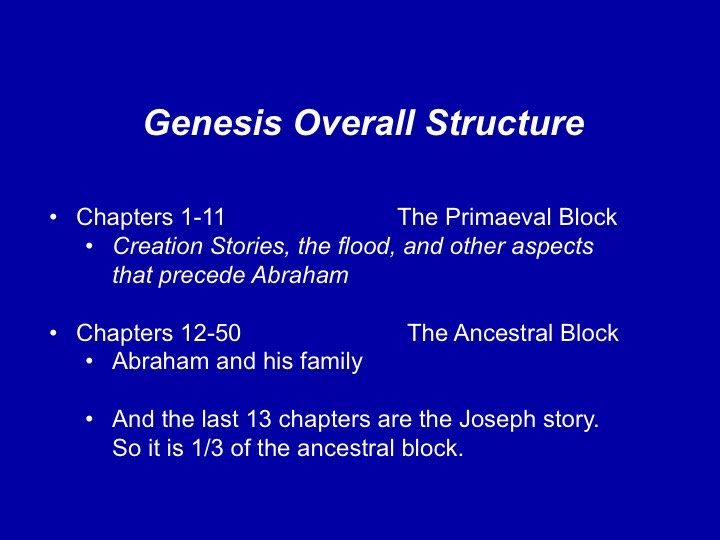
Genesis is often divided by scholars into major blocks in which Chapters 1-11 are the primeval block, which includes the things like the creation stories, the flood, and other aspects that precede the story of Abraham. They are basically the pre-history of Israel. Abraham then arrives in chapter 12 and from chapter 12-50 is referred to as the ancestral block; and tells the stories of Abraham and his somewhat dysfunctional family and all of their problems. Genesis ends with Israel in Egypt, ready for the coming of Moses and the Exodus.
But the ancestral block is heavily weighted toward one of Jacob’s sons – Joseph. The Joseph story takes up the last 13 chapters (1/3 of the ancestral block. and most of it occurs in Egypt.
But for reference purposes we need to start with a scorecard and reminder of the complete Abraham family as described in the ancestral block of Genesis. So many names that it is difficult to keep them straight. Where do the main characters of the Joseph story fit into all of this? So let’s talk about this before we move on.
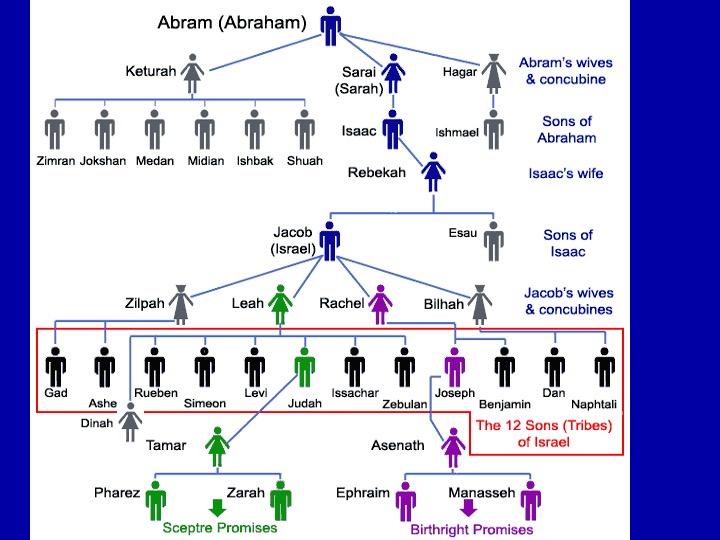
This is the growing family of Abraham. Let’s quickly review the important parts of it for this story. It begins at the top with Abraham and his wives and concubines. Of most importance for us today is to trace the linage through his wife Sarah whose sone was Isaac. Isaac and Rebekah has two sones, Jacob and Esau. Jacob plays an important role in the Joseph story in Egypt as the father of Joseph. I might mention at this time that Jacob is one of the characters in Genesis whose name was changed part way through the book as God later named him Israel. And in many places scripture that we read today he is sometimes is called Jacob, and sometimes Israel, in what seems to be a confusing way.
Importantly, although Jacob had several wives and concubines, who gave Jacob 12 sons (the origin of the twelve tribes of Israel) he strongly favored (as we shall see) his wife Leah who gave him his two youngest sons - Joseph and Benjamin.
So the main characters in the Joseph Story in Egypt will be Joseph himself, as well as all of his brothers and his father Jacob.
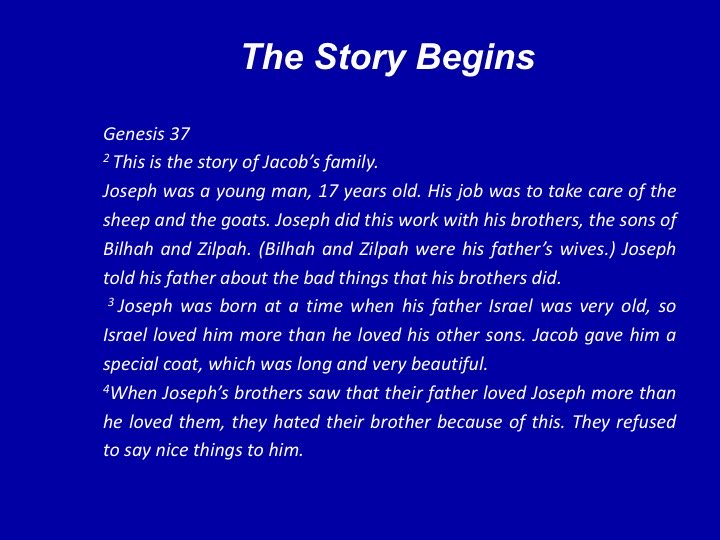
The Joseph Story in Egypt begins in Genesis 37.
2 This is the story of Jacob’s family. Joseph was a young man, 17 years old. His job was to take care of the sheep and the goats. Joseph did this work with his brothers, the sons of Bilhah and Zilpah. (Bilhah and Zilpah were his father’s wives.) Joseph told his father about the bad things that his brothers did.
3 Joseph was born at a time when his father Israel was very old, so Israel loved him more than he loved his other sons. Jacob gave him a special coat, which was long and very beautiful.
4 When Joseph’s brothers saw that their father loved Joseph more than he loved them, they hated their brother because of this. They refused to say nice things to him.
The story is set up here. And immediately there is conflict. And we learn that the young Joseph is a tattletale on his brothers. Furthermore we learn that Joseph’s now elderly father Israel (Jacob) played favorites – something Jacob should have known better about because his father Isaac had also played favorites with his sons. Great stories often begin with an obvious conflict, even in modern novels.
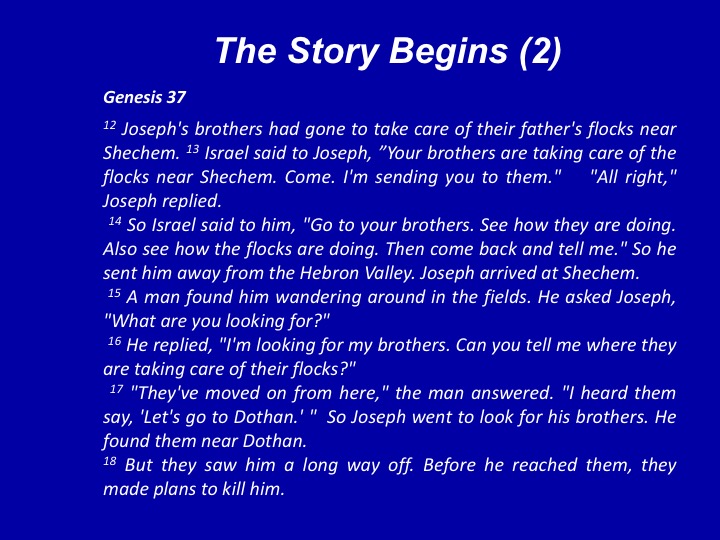
The Story Begins (2)
Genesis 37
12 Joseph's brothers had gone to take care of their father's flocks near Shechem. 13 Israel said to Joseph, ”Your brothers are taking care of the flocks near Shechem. Come. I'm sending you to them." "All right," Joseph replied.
14 So Israel said to him, "Go to your brothers. See how they are doing. Also see how the flocks are doing. Then come back and tell me." So he sent him away from the Hebron Valley. Joseph arrived at Shechem.
15 A man found him wandering around in the fields. He asked Joseph, "What are you looking for?"
16 He replied, "I'm looking for my brothers. Can you tell me where they are taking care of their flocks?"
17 "They've moved on from here," the man answered. "I heard them say, 'Let's go to Dothan.' " So Joseph went to look for his brothers. He found them near Dothan.
18 But they saw him a long way off. Before he reached them, they made plans to kill him.
And the story continues as Israel sends Joseph in search for his brothers. And we here learn the now familiar story of how Joseph’s brother’s plan to get even with him.
The original idea is to kill Joseph. But as you may remember Reuben suggests a different plan when he sees some traders coming and suggests that rather than kill Joseph they make some money on the deal and sell him into slavery.
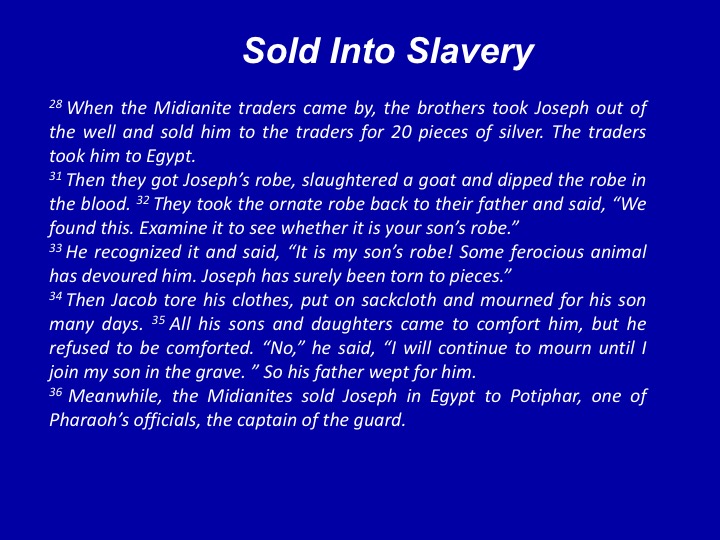
Sold Into Slavery
We will not read the entire story of the brother’s capture of Joseph and throwing him in a well. But we see beginning in verse 28 what the brothers finally did.
So now Joseph is in Egypt and we encounter our first Egyptian name. The very interesting story that follows describes the ongoing adventures of Joseph in Egypt. He rises quickly in the house of Potiphar and eventually is put in charge of his house. Sometime after that Potiphar’s wife tries to seduce Joseph and when he rejects her advances she accuses him of attempted rape and Joseph is thrown in prison. After he spends a great deal of time in prison he becomes famous there as an interpreter of dreams. And I might add that dream interpretation was a big deal in Egyptian culture (not so in Israelite culture). So when the Pharaoh has two vivid dreams that neither he nor his experts can fathom Joseph is hauled out of prison for an audience with the Pharaoh.
Potiphar is in fact an authentic Egyptian name so let’s break from the story for a while to look at some of the Egyptian names and customs that we see in this story.
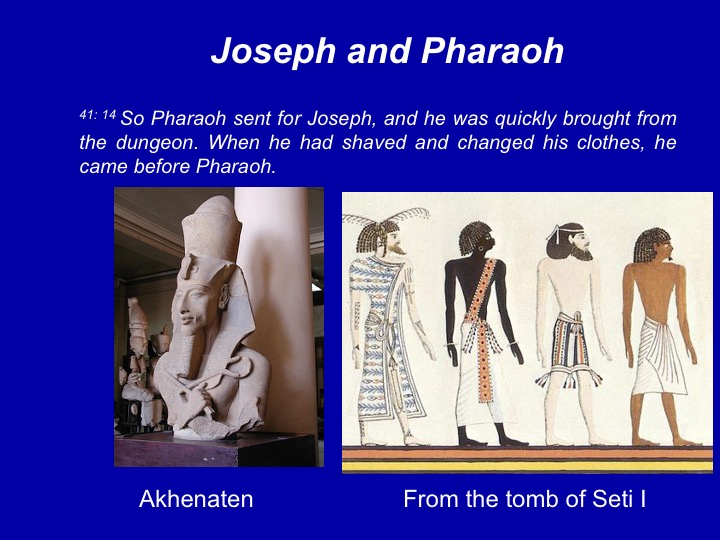
Joseph and Pharaoh
And as Joseph is summoned before the Pharaoh we read this in Genesis 41:14
41: 14 So Pharaoh sent for Joseph, and he was quickly brought from the dungeon. When he had shaved and changed his clothes, he came before Pharaoh.
Two images – the first is a recovered statue of Akhenaten – the supposed father of King Tut. It shows the typical Egyptian practice of staying clean shaven (except for a either a false beard as shown here) or maybe a very small goatee.
By contrast the relief from the tomb of the Pharoh Seti I is supposed to depict first a Libyan, a Nubian, an Asiatic, and an Egyptian. Asiatics was a general term for anyone from the Northeast – including the Land of Canaan and Mesopotamia. It is well recorded that the Egyptians were highly suspicious of foreigners.So it is liely that Joseph was shaved so that he was "acceptable" in Egyptian culture, expecially when meeting a Pharaoh.
So what happened – we will not read it but Joseph quickly interpreted the Pharaoh’s dream and told him there would be 7 years of record crops, followed by 7 years of total famine in the land and that God was warning him that he had better appoint someone of great ability to collect and store grain for the next 7 years and then manage the distribution of it after that to avoid widespread starvation. And the pharaoh was so impressed he appointed Joseph as his Viceroy to manage all of this.
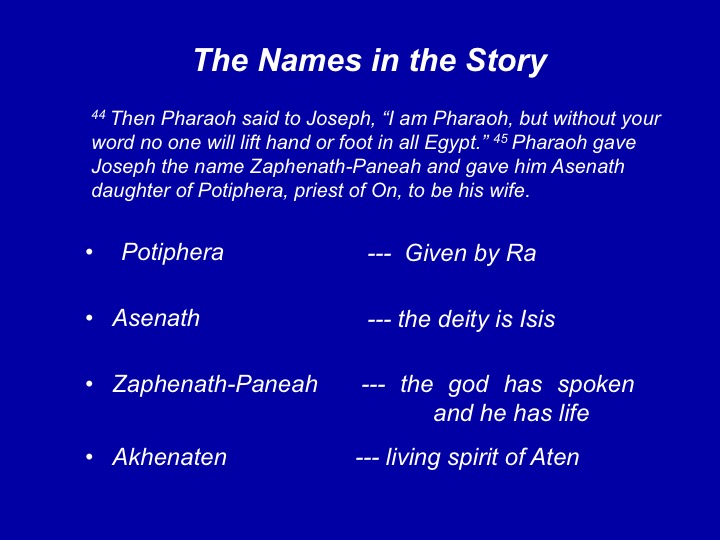
The Names in the Story
44 Then Pharaoh said to Joseph, “I am Pharaoh, but without your word no one will lift hand or foot in all Egypt.” 45 Pharaoh gave Joseph the name Zaphenath-Paneah and gave him Asenath daughter of Potiphera, priest of On, to be his wife.
The names in the story are also authentically Egyptian, including Potiphar (whom we encountered in the previous lecture), Potiphera (a variant form of the same name, the father-in-law of Joseph), Asenath (Joseph's Egyptian wife), and Zaphenath-paneah (Joseph's Egyptian name, meaning something like "the god has spoken and he has life").
C. Names in antiquity typically have the name of the deity whom one worships embedded into them.
1. Potiphar, Joseph's master, and Potiphera, Joseph's new father in-law, are variants of the same name, meaning "given by Ra."
2. Earlier we referred to Akhenaten, and showed his statue. The god Aten appears in his name.
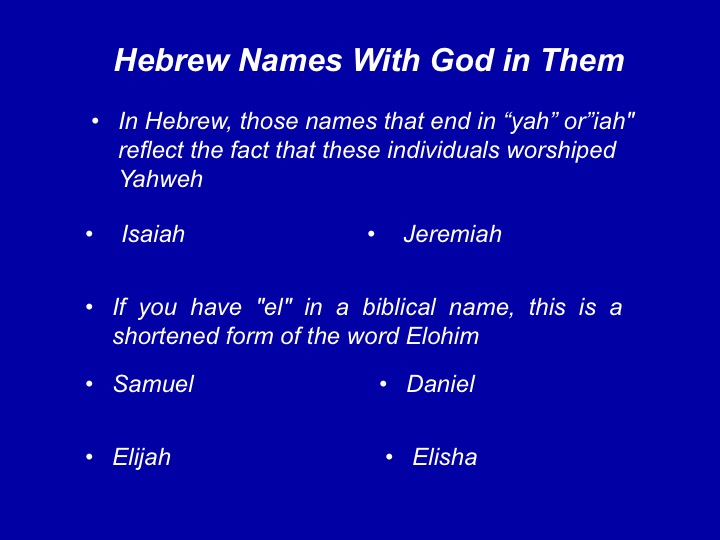
Hebrew Names With God in Them
And lest you think this habit of putting God’s name in your name is exclusively Egyptian – let’s look at some Hebrew names.
In Hebrew, those names that end in "yah" reflect the fact that these individuals worshiped Yahweh-"yah" is a shortened form of Yahweh-as you see at the end of names such as Isaiah and Jeremiah. If you have "el" in a biblical name, this is a shortened form of the word Elohim, as you get in at the end of Samuel, and Daniel, or at the beginning of Elijah and Elisha.
Joseph's father-in-law is a priest in the city of On, an authentic place in ancient Egypt, the center of worship of the sun-god Ra, and, thus, later called, most appropriately, Heliopolis by the Greeks (located in the northern suburbs of modern Cairo).
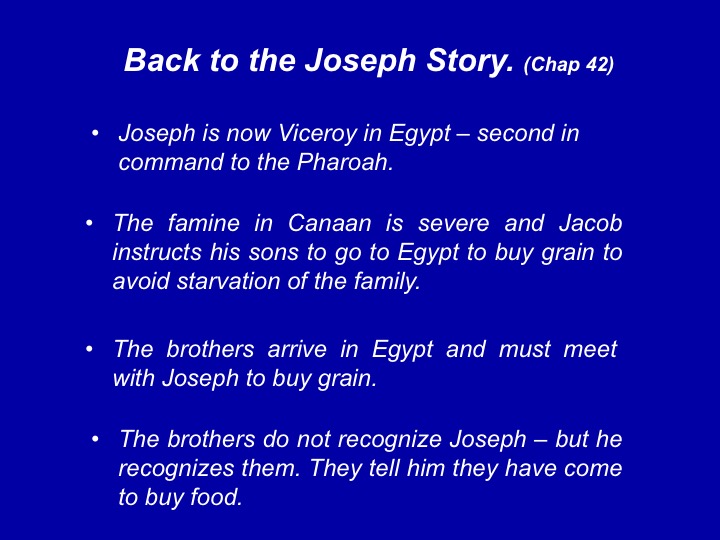
Back to the Joseph Story and Egypt
And now we return to the Joseph Story and Egypt and review the elements we already know from this well told story.
Joseph is now Viceroy in Egypt – second in command to the Pharaoh.
The famine in Canaan is severe and Jacob instructs his sons to go to Egypt to buy grain to avoid starvation of the family.
The brothers arrive in Egypt and must meet with Joseph to buy grain.
The brothers do not recognize Joseph – but he recognizes them. They tell him they have come to buy food.
At this point in the story there is tension because we do not know exactly what Joseph is thinking about his brothers. And what he does next sounds ominous.
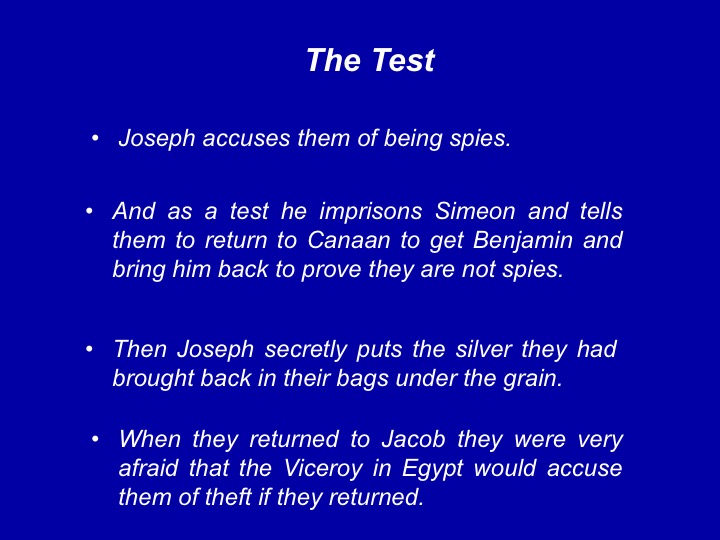
The Test
Joseph accuses them of being spies.
And as a test he imprisons Simeon and tells them to return to Canaan to get Benjamin and bring him back to prove they are not spies.
Then Joseph secretly puts the silver they had brought back in their bags under the grain.
When they returned to Jacob, they were very afraid that the Viceroy in Egypt would accuse them of theft if they returned.
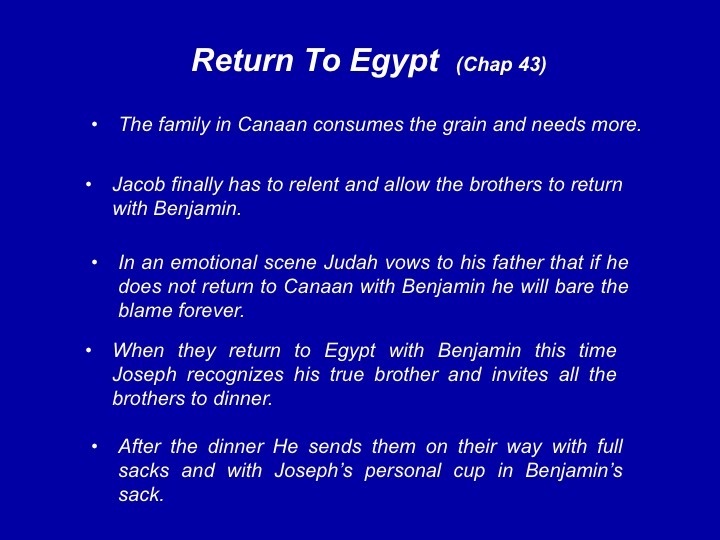
Return To Egypt (Chap 43)
The family in Canaan consumes the grain and needs more.
Jacob finally has to relent and allow the brothers to return with Benjamin.
In an emotional scene Judah vows to his father that if he does not return to Canaan with Benjamin he will bare the blame forever.
When they return to Egypt with Benjamin this time Joseph recognizes his true brother and invites all the brothers to dinner.
After the dinner He sends them on their way with full sacks but with Joseph’s personal cup hidden in Benjamin’s sack.
The brothers, in bringing Benjamin to Egypt, were able to prove they were not spies, but Joseph was not through with them yet!
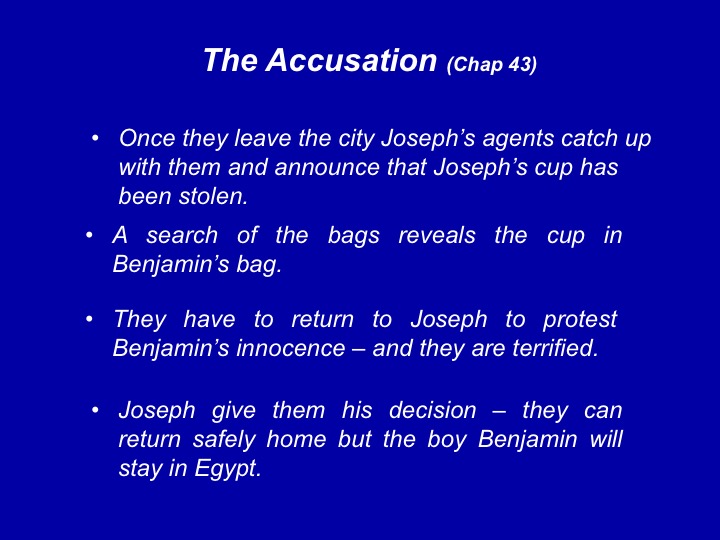
The Accusation (Chap 43)
Once they leave the city Joseph’s agents catch up with them and announce that Joseph’s cup has been stolen.
A search of the bags reveals the cup in Benjamin’s bag.
They have to return to Joseph to protest Benjamin’s innocence – and they are terrified.
Joseph give them his decision – they can return safely home but the boy Benjamin will stay in Egypt.
As you can imagine this is something the brothers did not want to happen. They knew it would cause the death of their father.
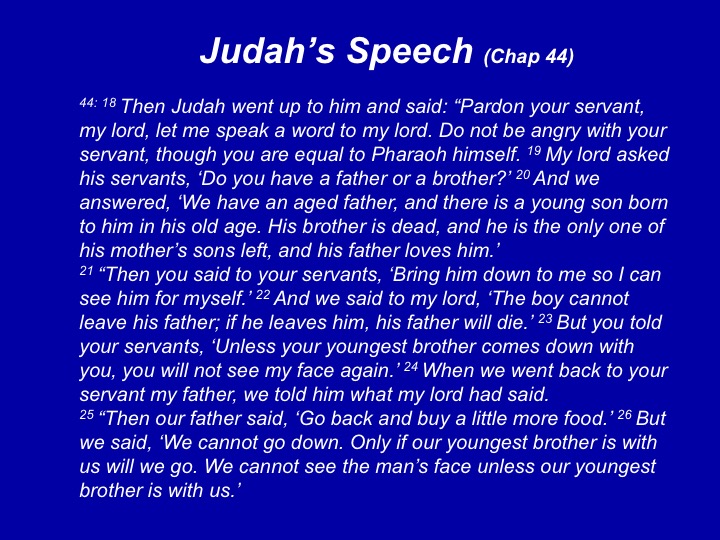
Judah’s Speech (Chap 44)
And now we read my favorite part of this story. No other speech in Genesis is more than 2 or 3 verses. This is 17 uninterrupted verses in which Judah “grows up” as a man. Let’s read it together.
44: 18 Then Judah went up to him and said: “Pardon your servant, my lord, let me speak a word to my lord. Do not be angry with your servant, though you are equal to Pharaoh himself. 19 My lord asked his servants, ‘Do you have a father or a brother?’ 20 And we answered, ‘We have an aged father, and there is a young son born to him in his old age. His brother is dead, and he is the only one of his mother’s sons left, and his father loves him.’
21 “Then you said to your servants, ‘Bring him down to me so I can see him for myself.’ 22 And we said to my lord, ‘The boy cannot leave his father; if he leaves him, his father will die.’ 23 But you told your servants, ‘Unless your youngest brother comes down with you, you will not see my face again.’ 24 When we went back to your servant my father, we told him what my lord had said.
25 “Then our father said, ‘Go back and buy a little more food.’ 26 But we said, ‘We cannot go down. Only if our youngest brother is with us will we go. We cannot see the man’s face unless our youngest brother is with us.’
And it continues:
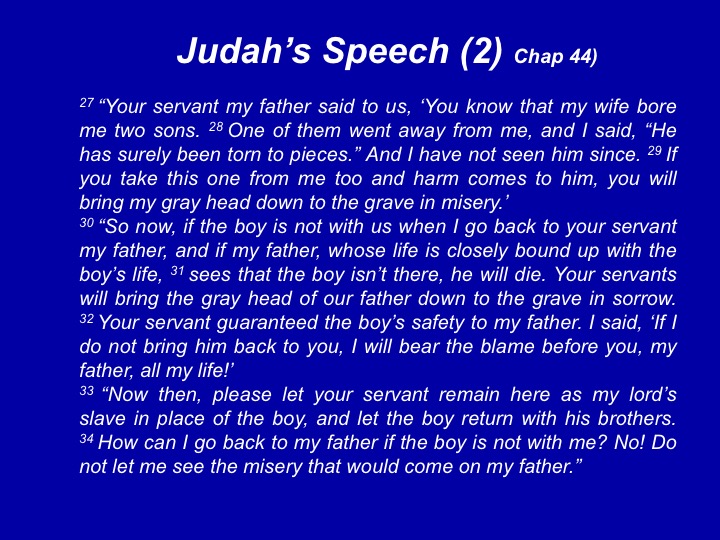
Judah’s Speech (2) Chap 44)
27 “Your servant my father said to us, ‘You know that my wife bore me two sons. 28 One of them went away from me, and I said, “He has surely been torn to pieces.” And I have not seen him since. 29 If you take this one from me too and harm comes to him, you will bring my gray head down to the grave in misery.’
30 “So now, if the boy is not with us when I go back to your servant my father, and if my father, whose life is closely bound up with the boy’s life, 31 sees that the boy isn’t there, he will die. Your servants will bring the gray head of our father down to the grave in sorrow. 32 Your servant guaranteed the boy’s safety to my father. I said, ‘If I do not bring him back to you, I will bear the blame before you, my father, all my life!’
33 “Now then, please let your servant remain here as my lord’s slave in place of the boy, and let the boy return with his brothers. 34 How can I go back to my father if the boy is not with me? No! Do not let me see the misery that would come on my father.”
In the end Judah offers to stay behind as a slave in order to save Benjamin and my inference save his father from dying of grief.
As I mentioned before it is difficult to understand why Joseph played all of this the way he did until now, but I like to think that Judah’s speech really got under his skin. Let’s review how he responded:
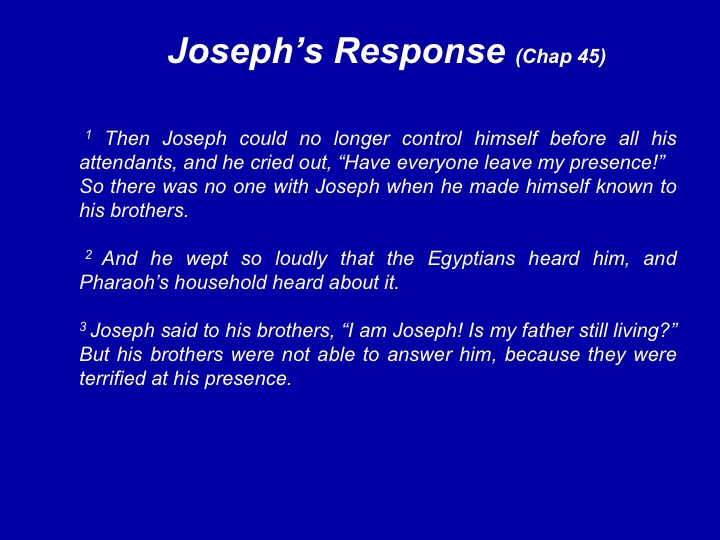
Joseph’s Response (Chap 45)
1 Then Joseph could no longer control himself before all his attendants, and he cried out, “Have everyone leave my presence!” So there was no one with Joseph when he made himself known to his brothers.
2 And he wept so loudly that the Egyptians heard him, and Pharaoh’s household heard about it.
3 Joseph said to his brothers, “I am Joseph! Is my father still living?” But his brothers were not able to answer him, because they were terrified at his presence.
And now for the first time Joseph revels who he is to his brothers.
They are stunned and frightened. Stunned because they had no idea that the Viceroy was actually the brother that they thought they had killed. And frightened because surely their powerful brother will now take his revenge for what they did.
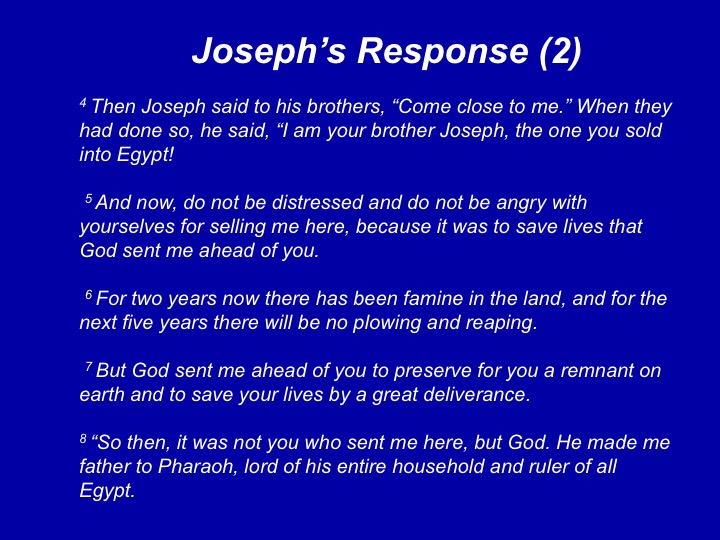
Joseph’s Response (2)
4 Then Joseph said to his brothers, “Come close to me.” When they had done so, he said, “I am your brother Joseph, the one you sold into Egypt!
5 And now, do not be distressed and do not be angry with yourselves for selling me here, because it was to save lives that God sent me ahead of you.
6 For two years now there has been famine in the land, and for the next five years there will be no plowing and reaping.
7 But God sent me ahead of you to preserve for you a remnant on earth and to save your lives by a great deliverance.
8 “So then, it was not you who sent me here, but God. He made me father to Pharaoh, lord of his entire household and ruler of all Egypt.
But Joseph instead tells them that all of this was God’s plan to save the lives of the people of Israel (Jacob).
Then he continues:
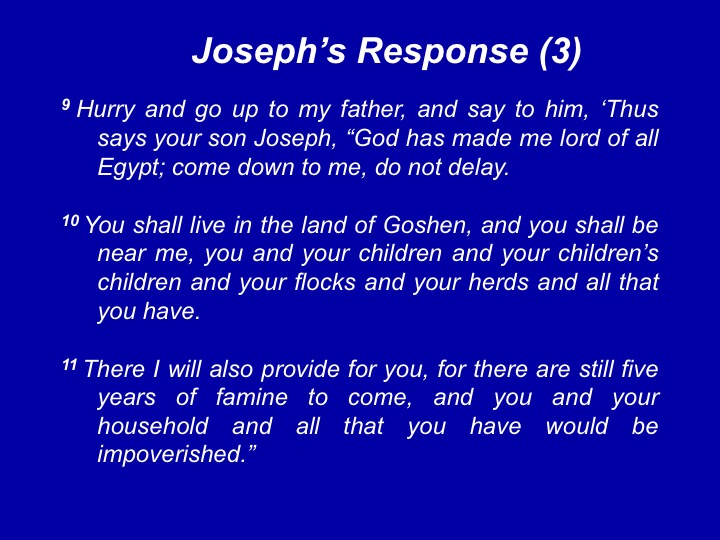
Joseph’s Response (3)
9 Hurry and go up to my father, and say to him, ‘Thus says your son Joseph, “God has made me lord of all Egypt; come down to me, do not delay.
10 You shall live in the land of Goshen, and you shall be near me, you and your children and your children’s children and your flocks and your herds and all that you have.
11 There I will also provide for you, for there are still five years of famine to come, and you and your household and all that you have would be impoverished.”
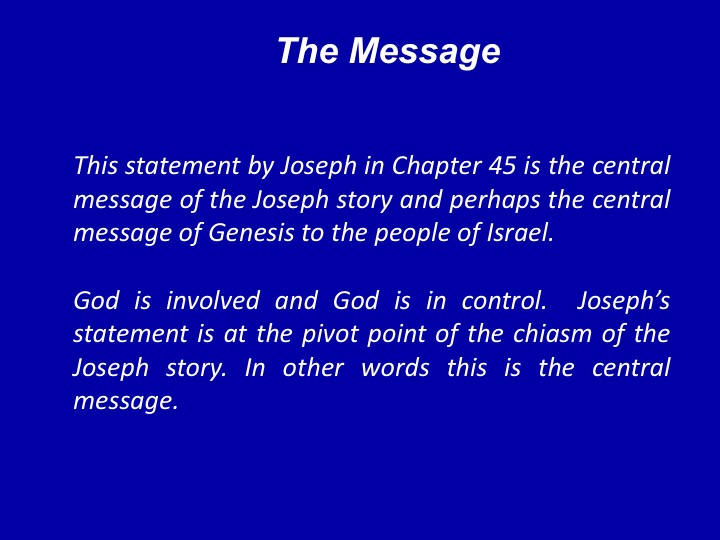
The Message
This statement by Joseph is the central message of the Joseph story and perhaps the central message of Genesis to the people of Israel.
God is involved and God is in control. Joseph’s statement is at the pivot point of the chiasm of the Joseph story. In other words this is the central message. We don't have time to review the chiastic structure that often occurs in ancient oral stories. But we taught it in this class years ago. And it appears in almost every major story in Genesis. It is believed oral stories were constructed to make it clear what the most important part of the story is. The chiasm of the Joseph story was this message of Joseph to his brothers. A reader of this story would have made that very clear to his listeners.
The hand of God is always to be seen in the history of Israel.
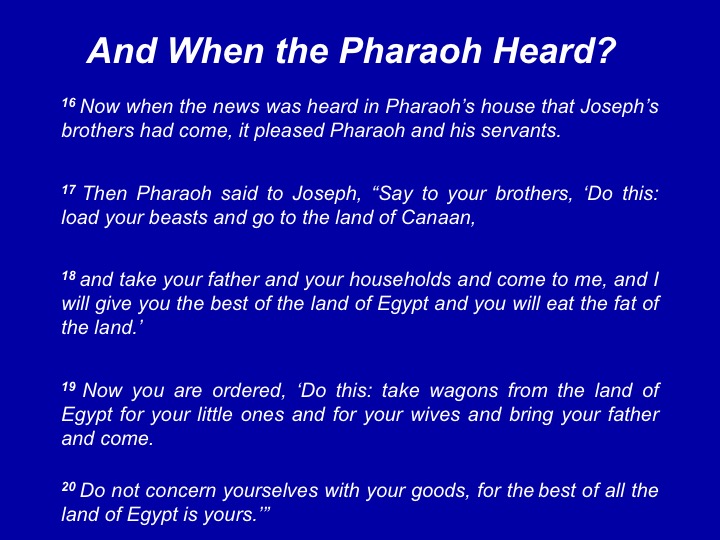
And When the Pharaoh Heard
16 Now when the news was heard in Pharaoh’s house that Joseph’s brothers had come, it pleased Pharaoh and his servants.
17 Then Pharaoh said to Joseph, “Say to your brothers, ‘Do this: load your beasts and go to the land of Canaan,
18 and take your father and your households and come to me, and I will give you the best of the land of Egypt and you will eat the fat of the land.’
19 Now you are ordered, ‘Do this: take wagons from the land of Egypt for your little ones and for your wives and bring your father and come.
20 Do not concern yourselves with your goods, for the best of all the land of Egypt is yours.’”
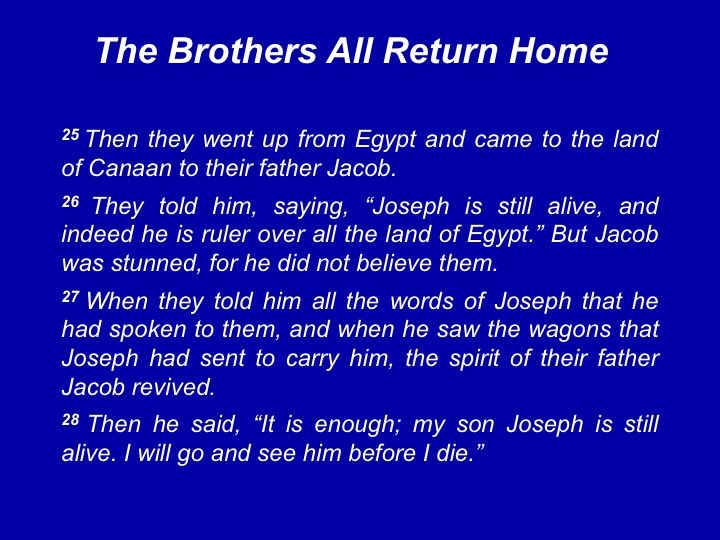
So The Brothers Returned
25 Then they went up from Egypt, and came to the land of Canaan to their father Jacob.
26 They told him, saying, “Joseph is still alive, and indeed he is ruler over all the land of Egypt.” But he was stunned, for he did not believe them.
27 When they told him all the words of Joseph that he had spoken to them, and when he saw the wagons that Joseph had sent to carry him, the spirit of their father Jacob revived.
28 Then Israel said, “It is enough; my son Joseph is still alive. I will go and see him before I die.”
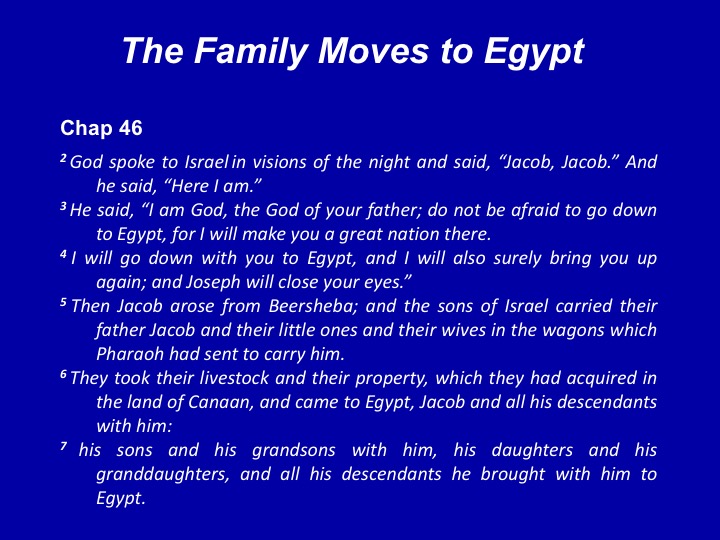
The Family Moves to Egypt
Chap 46
2 God spoke to Israel in visions of the night and said, “Jacob, Jacob.” And he said, “Here I am.”
3 He said, “I am God, the God of your father; do not be afraid to go down to Egypt, for I will make you a great nation there.
4 I will go down with you to Egypt, and I will also surely bring you up again; and Joseph will close your eyes.”
5 Then Jacob arose from Beersheba; and the sons of Israel carried their father Jacob and their little ones and their wives in the wagons which Pharaoh had sent to carry him.
6 They took their livestock and their property, which they had acquired in the land of Canaan, and came to Egypt, Jacob and all his descendants with him:
7 his sons and his grandsons with him, his daughters and his granddaughters, and all his descendants he brought with him to Egypt.
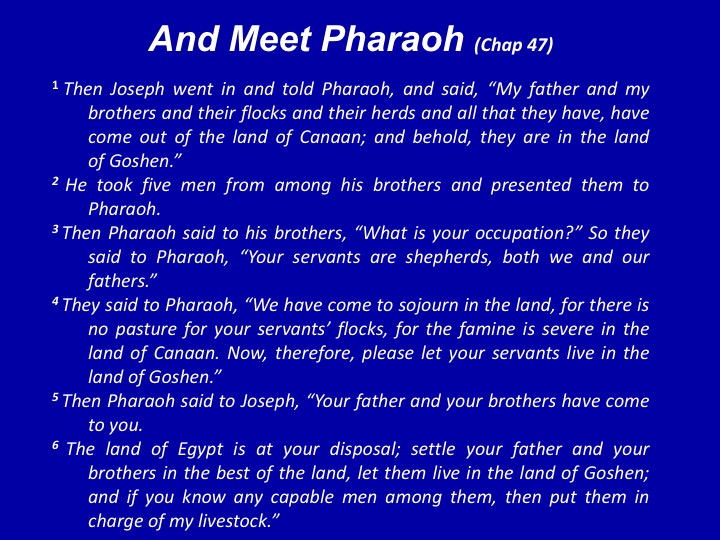
And Meet Pharaoh (Chap 47)
1 Then Joseph went in and told Pharaoh, and said, “My father and my brothers and their flocks and their herds and all that they have, have come out of the land of Canaan; and behold, they are in the land of Goshen.”
2 He took five men from among his brothers and presented them to Pharaoh.
3 Then Pharaoh said to his brothers, “What is your occupation?” So they said to Pharaoh, “Your servants are shepherds, both we and our fathers.”
4 They said to Pharaoh, “We have come to sojourn in the land, for there is no pasture for your servants’ flocks, for the famine is severe in the land of Canaan. Now, therefore, please let your servants live in the land of Goshen.”
5 Then Pharaoh said to Joseph, “Your father and your brothers have come to you.
6 The land of Egypt is at your disposal; settle your father and your brothers in the best of the land, let them live in the land of Goshen; and if you know any capable men among them, then put them in charge of my livestock.”
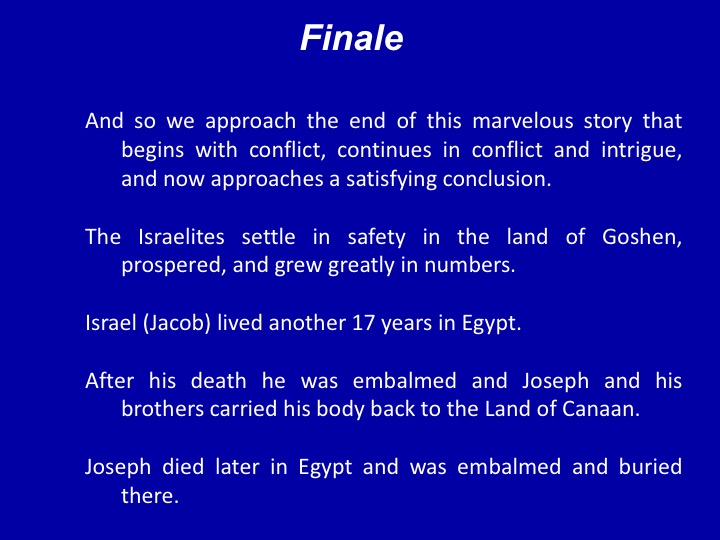
Finale
And so we approach the end of this marvelous story that begins with conflict, continues in conflict and intrigue, and now approaches a satisfying conclusion.
The Israelites settle in safety in the land of Goshen, prospered, and grew greatly in numbers.
Israel (Jacob) lived another 17 years in Egypt.
After his death he was embalmed and Joseph and his brothers carried his body back to the Land of Canaan.
Joseph died later in Egypt and was embalmed and buried there.
So the finale was a happy ending with the conflicts resolved. But the story continues and I would like to show one more slide to show how these stories are almost always told.
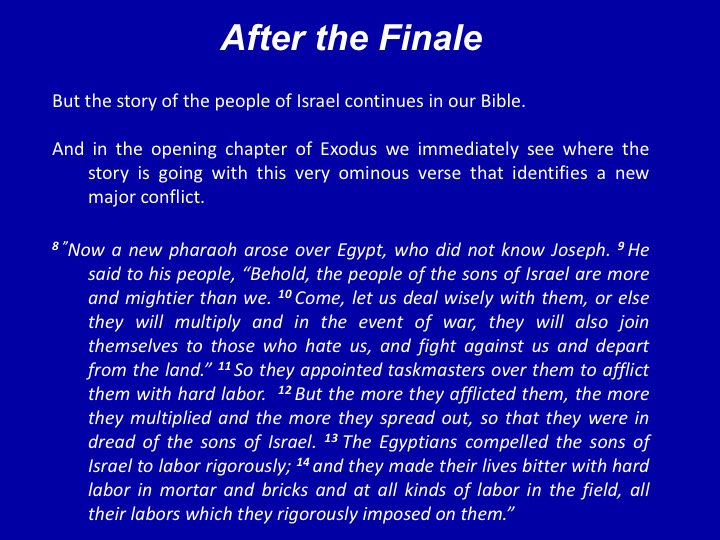
After the Finale
But the story of the people of Israel continues in our Bible.
And in the opening chapter of Exodus we immediately see where the story is going with this very ominous verse that identifies a new major conflict. It is verse 8 of chapter 1.
8 Now a new king arose over Egypt, who did not know Joseph. 9 He said to his people, “Behold, the people of the sons of Israel are more and mightier than we. 10 Come, let us deal wisely with them, or else they will multiply and in the event of war, they will also join themselves to those who hate us, and fight against us and depart from the land.” 11 So they appointed taskmasters over them to afflict them with hard labor. And they built for Pharaoh storage cities, Pithom and Raamses. 12 But the more they afflicted them, the more they multiplied and the more they spread out, so that they were in dread of the sons of Israel. 13 The Egyptians compelled the sons of Israel to labor rigorously; 14 and they made their lives bitter with hard labor in mortar and bricks and at all kinds of labor in the field, all their labors which they rigorously imposed on them.
So a new pharaoh arose who did not know and love Joseph. And as you see he very quickly turned these formally free people into abject slaves. We now have a new conflict to unravel. And the first hint of how that happened was chapter 2 in which a new baby named Moses was born to a Hebrew slave. Fantastic storytelling.

So let's break for any discussion and questions.